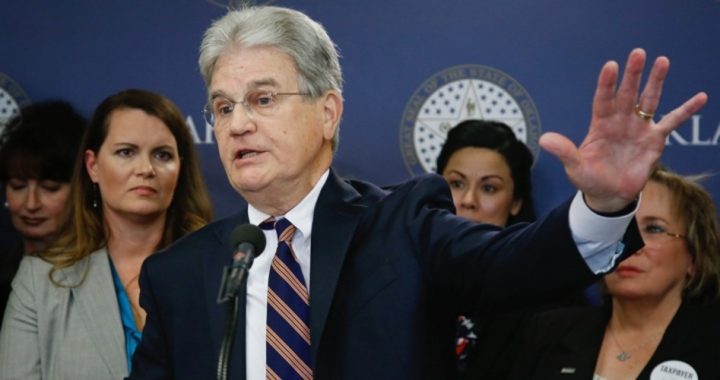
Former U.S. Senator Tom Coburn (R-Okla.), who has been a paid lobbyist for the Convention of States organization, has seized upon yet another excuse to justify a Constitutional Convention. In a column published this week in The Washington Examiner, Coburn praised the book by Philip Howard, Try Common Sense, which rightly criticizes the proliferation of laws passed by Congress over the years.
Coburn notes, “Getting a permit requires running a legal gauntlet of multiple agencies with overlapping requirements,” leading to soaring deficits “because Congress lacks the discipline to set priorities or abolish obsolete laws, regulations, and programs. These trillion-dollar deficits are not just bad policy but immoral.”
No doubt they are, but the reader should know that Senator Coburn voted to add to the national debt when, in 2008, he voted for the infamous bail-out of the big banks. When later challenged that such a bill was unconstitutional, he explained that the ATMs were going to freeze up.
Still, during his tenure in Congress, Coburn often attacked federal waste, and is to be commended for that. And he is correct that the growing national debt is a huge problem.
The problem is what Coburn now offers as a solution: “What can we do about it?” he asks. “Washington will never fix itself. But Trump’s election signifies that Washington’s current political establishment is on its last legs.”
Because of this, Coburn suggests following Howard’s plan to replace “thick rulebooks with simpler, goal-oriented codes.”
“How do we get there?” Predictably, Coburn sees yet another opportunity to push for a “convention of states,” or as some call it, a constitutional convention. (One would almost think that Coburn, a physician, might someday suggest a convention of states to cure heart disease, as he sees a convention as the cure-all for all of our problems.)
“Here’s where the states come in,” Coburn explains. “Article V of the Constitution allows two-thirds of the states to call for a convention of states for the sole purpose of proposing amendments to the U.S. Constitution. It would take 38 states to ratify any resulting amendments.”
What Coburn neglects to add is that the last time we had a convention of states — the 1787 Constitutional Convention, which produced our present Constitution — the delegates were likewise restricted to the “sole purpose of revising the Articles of Confederation,” which was the constitution the U.S. had at that time. Clearly, they exceeded their mandate and wrote an entirely new document. Additionally, any amendments to the Articles of Confederation required not three-fourths of the states to ratify, as is our present ratification method, but rather a unanimous consent of all the states. That requirement, clearly, was lowered to three-fourths in order to get the new Constitution ratified.
Furthermore, if the orignial delagates of 1787 did not limit their convention to reivsing the Articles, what guarantee do we have today that delegates at a current convention — who would come from California and Massachusetts, as well as Oklahoma and Utah — would restrict themselves to passing amendments to limit the power of the federal government? Many on the Left are salivating at the thought of gutting the Second Amendment, for example, at any such convention of states.
Coburn is certainly a persistent advocate for a national convention to develop amendments to our present Constitution: He has visited over 40 states in just the last three years, lobbying for a Con-Con.
So, what great solution did Howard offer, and Coburn endorse, that could be passed at a Con-Con?
According to Coburn, “Howard proposes a constitutional amendment to give governors the power, every 15 years, to appoint a “recodification commission” to examine and make proposals to fix federal regulatory programs. Creating simplified codes always requires drafting by a small group of experts.”
Historical examples noted by Howard include the Justinian Code in the Byzantine Empire, the Napoleonic Code, and the Uniform Commercial Code in the United States in the 1950s.
“The Napoleonic Code took four judges only five months to draft,” Coburn wrote, evidently praising how swiftly Napoleon got things done. But, of course, Napoleon Bonaparte was an absolute dictator, so the circumstances were somewhat different from what happens in a constitutional republic such as we have in America. And Justinian was an emperor. He exercised essentially absolute power in Constantinople in the sixth century.
Coburn concedes that after the commission has done its work, Congress would still have to approve of that work. Do we really want to see the “work” of governors such as Cuomo of New York and Newsom of California?
In other words, we have circled back to the source of the problem: Congress. And who chooses the members of Congress? The people of the United States, of course — the same people who would be picking the delegates to any Con-Con. These same people are the electorate who gave us Nancy Pelosi and the rest of our present Congress. Are they going to suddenly wise up and pick a bunch of James Madisons?
Madison, who is considered the principal person responsible for our Constitution, expressed fear for the future of the country if we ever had another constitutional convention.
Instead of solving the problems facing the country today, the proposal by Tom Coburn to turn things over to an oligarchical group to determine our future as a country seems to be going in the wrong direction. What we need is an electorate better educated in the principles used by Madison, Washington, and Hamilton back in 1787. It is highly doubtful that people of the calibre of the Founding Fathers would populate a present-day convention of states, as envisioned by Tom Coburn and the other supporters of that dangerous concept.
Photo: AP Images





